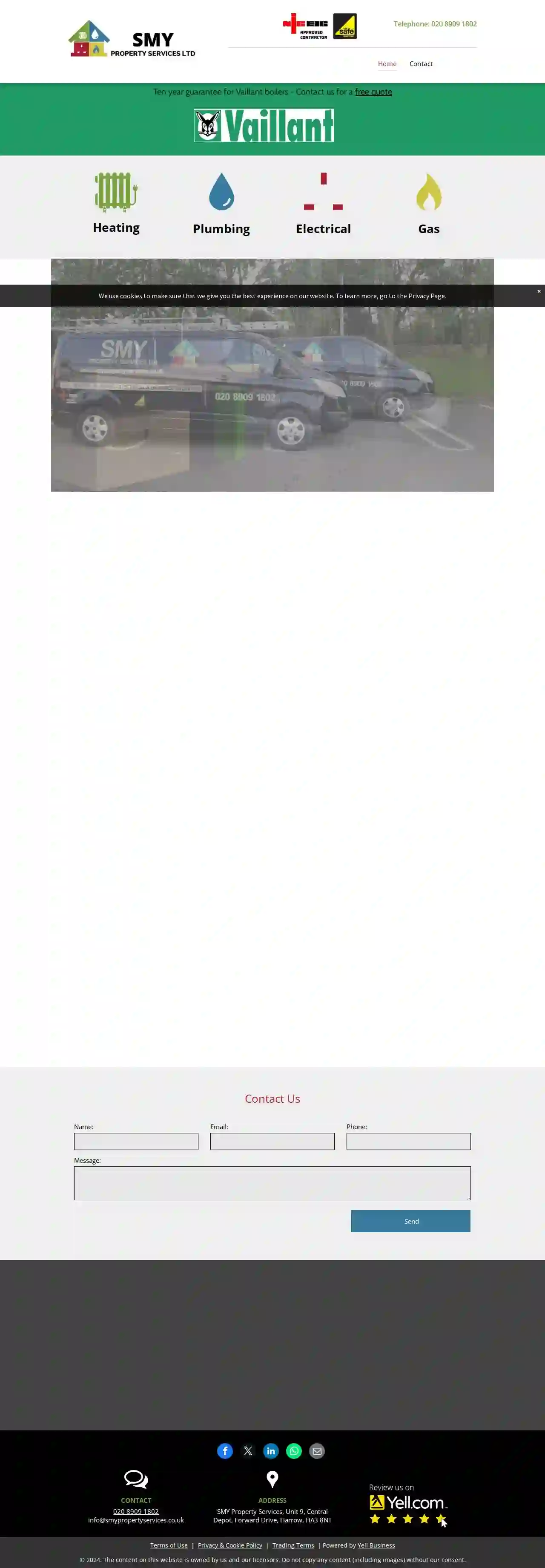Emergency HVAC Harrow
Find the best Emergency HVAC Service in Harrow
Get multiple 24/7 HVAC Repair quotes for your project today! Compare profiles, reviews, accreditations, portfolio, etc... and choose the best offer.
- Th
The Harrow Heat Pump Installers
51 reviewsHarrow, GB- Services
- Why Us?
Get Quote - NI
NIB Air Services
4.914 reviewsHarrow, GB- Services
- Why Us?
Get Quote 
SMY Property Services
4.58 reviewsUnit 9, Central Depot, Forward Drive, Harrow, HA3 8NT, GBEstablished in 1957, Smy Property Services is a family-run business providing heating, plumbing, and electrical services in Harrow and surrounding areas. With over 50 years of experience, we pride ourselves on our reputation for high-quality installations, maintenance, and repairs. Our team of Gas Safe registered engineers and NICEIC approved electricians are dedicated to providing a friendly, reliable, and local service. We offer a 10-year guarantee for Vaillant boilers and provide free quotes for all our services. Contact us today to learn more about how we can assist you with your heating, plumbing, or electrical needs.
- Services
- Why Us?
- Accreditations
- Gallery
Get Quote- We
Wembley Heating
58 reviewsHarrow, GB- Services
- Why Us?
Get Quote - TD
TDC Plumbing & Heating LTD
5111 reviewsHarrow, GB- Services
- Why Us?
Get Quote - Ha
Harrow Heating & Plumbing
51 reviewsHarrow, GB- Services
- Why Us?
Get Quote - S.
S.Harrow Plumbing, Heating & Bathroom Merchants
4.652 reviewsHarrow, GB- Services
- Why Us?
Get Quote - Ul
Ultra Gas Flow
4.914 reviewsHarrow, GB- Services
- Why Us?
Get Quote - Ha
Harrow Athletic Club
4.77 reviewsHarrow, GB- Services
- Why Us?
Get Quote - Co
Cool Sleep - Air Conditioning Ruislip
521 reviewsHarrow, GB- Services
- Why Us?
Get Quote
Over 16,895+ HVAC Contractors in our network
Our HVAC pros operate in Harrow & surroundings!
HVACCompaniesHub has curated and vetted the Best HVAC Companies in Harrow. Find a top & reliable business today.
Frequently Asked Questions About Emergency HVAC Services
- Change or clean air filters every 1-3 months.
- Clear debris from around the outdoor unit.
- Check and clean the evaporator coil (if accessible).
- Inspect refrigerant lines for leaks.
How long does it take for an emergency HVAC technician to arrive?
What is a dehumidifier, and do I need one?
What is carbon monoxide, and how can it affect my HVAC system?
How do I maintain my air conditioner?
How long does it take for an emergency HVAC technician to arrive?
What is a dehumidifier, and do I need one?
What is carbon monoxide, and how can it affect my HVAC system?
How do I maintain my air conditioner?
- Change or clean air filters every 1-3 months.
- Clear debris from around the outdoor unit.
- Check and clean the evaporator coil (if accessible).
- Inspect refrigerant lines for leaks.